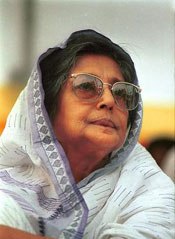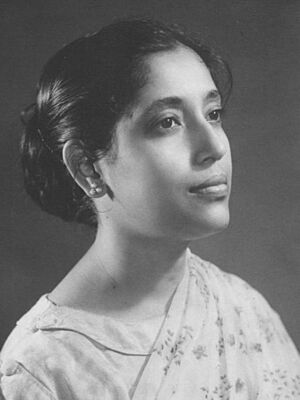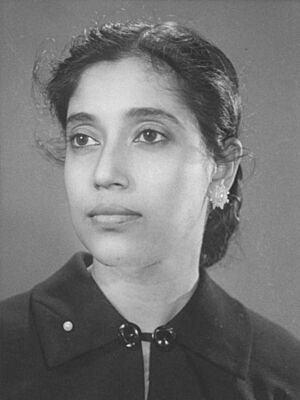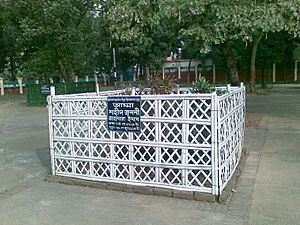Jahanara Imam facts for kids
Quick facts for kids
Jahanara Imam
|
|
|---|---|
| জাহানারা ইমাম | |

Imam in 1993
|
|
| Born | 3 May 1929 Murshidabad, Bengal Presidency, British India
|
| Died | 26 June 1994 (aged 65) Detroit, Michigan, U.S.
|
| Resting place | Dhaka, Bangladesh |
| Nationality | British Indian (1929-1947) Bangladeshi(1971-1994) |
| Education | MA |
| Alma mater | University of Dhaka University of San Diego |
| Spouse(s) |
Sharif Imam
(m. 1948–1971) |
| Children | Shafi Imam Rumi (son) Saif Imam Jami (son) |
| Parents |
|
Jahanara Imam (born May 3, 1929 – died June 26, 1994) was a brave writer and activist from Bangladesh. She is famous for trying to bring people who committed terrible acts during the Bangladesh Liberation War to justice. People called her "Shaheed Janani," which means 'Mother of Martyrs,' because of her courage.
Contents
About Jahanara Imam's Life
Jahanara Imam was born on May 3, 1929, in Murshidabad, which was part of British India. She was the oldest of seven children (three brothers and four sisters). Her father, Syed Abdul Ali, was a government worker in Bengal. His job meant the family moved to many different places.
At that time, it was hard for Muslim women to study more. But her mother, Hamida, made sure Jahanara could get a good education. After finishing college in Rangpur in 1945, Jahanara went to Lady Brabourne College in Calcutta. She earned her bachelor's degree there in 1947. She was also an active student at the college.
After India was divided, she moved to Mymensingh in what became East Pakistan. She started teaching at Vidyamoyee Govt. Girls High School. In 1948, she married Shariful Alam Imam Ahmed, an engineer she met in college. They settled in Dhaka.
Jahanara became the Head Mistress at Siddheswari Girls School. She helped make it one of the best girls' schools in Dhaka. She was also the first editor of a women's magazine called "Khawateen," which started in 1951. She ran it successfully for several years.
In 1960, Imam left her job as head mistress to focus on raising her two sons. Her sons, Rumi and Jami, were born in 1951 and 1954. She felt it was important to spend time raising her own children.
During this time, Imam continued her own studies. She earned a master's degree in Bengali language and literature in 1962. She also got a bachelor's degree in education from the University of Dhaka in 1963. After that, she went back to teaching full-time. From 1966 to 1968, she taught at the Teacher's Training College in Dhaka. She also taught part-time at the University of Dhaka for several years starting in 1970.
Jahanara Imam spent a big part of her life in education. She visited the United States twice. First, in 1964–65, as a Fulbright Scholar at the University of San Diego. Then again in 1977, invited by the U.S. Government.
The 1971 Liberation War
In 1971, the Bangladesh Liberation War began after the Pakistan army started a crackdown. Many people joined the fight for freedom. Jahanara's older son, Shafi Imam Rumi, joined the Mukti Bahini. This was a group of freedom fighters.
During the war, Jahanara wrote a diary about her feelings and the struggle. This diary later became a very important book about the war. Rumi took part in many actions against the Pakistan army. Sadly, he was captured by the army and was never seen again.
Jahanara's husband, Sharif Imam, and her younger son, Jami, were also taken for questioning. They were badly treated. Her husband came home very ill and died just three days before Bangladesh became free on December 16, 1971.
Her Books and Writings
After Bangladesh became independent, Jahanara Imam started her writing career. She also traveled a lot to Europe, the USA, and Canada. In 1986, she published her wartime diary, Ekatturer Dinguli (The Days of Seventy One).
Imam's diary was a very personal story of sadness, similar to Anne Frank's diary. Her simple writing style touched many people's hearts. Especially those families who had lost loved ones during the war. Early in her career, Jahanara Imam also translated several books from English into Bengali. These included some of the popular "Little House" books by Laura Ingalls Wilder.
Fighting for Justice
After the war, President Ziaur Rahman allowed a political party called Bangladesh Jamaat-e-Islami to return. This party had worked with the Pakistani army during the war. Members of this group had committed crimes against people.
Ghulam Azam, a leader of this party, was allowed to come back to Bangladesh in 1978. In 1991, he was elected as the head of his party. Jahanara Imam then started a group called the Ghatak-Dalal Nirmul Committee. This name means "Committee for Eradicating the Killers and Collaborators of '71." She became the public face of this group.
The committee asked for trials for people who committed crimes during the 1971 war. On March 26, 1992, the committee held a "People's Court" in Dhaka. They named people they believed were war criminals. Jahanara Imam and others were accused of treason by the government at that time. However, this charge was dropped in 1996, after her death.
Death and Remembering Her
In 1981, doctors found that Jahanara Imam had mouth cancer. Operations made it hard for her to speak. But she kept writing and stayed involved with the freedom fighters. She passed away on June 26, 1994, in Michigan, U.S. She was later buried in Dhaka.
People in Bangladesh remember her on her death anniversary every year. A person named Nuran Nabi wrote a book about her called "The Last Days of Jahanara Imam in America."
Awards and Recognition
- Award from Bangladesh Writer's Association (1988)
- Bangla Academy Literary Award (1991)
- Independence Day Award (1997)
- Rokeya Padak (1998)
Her Books
- Anya Jiban (1985) (Other life)
- Ekattorer Dingulee (1986) (The days of 1971)
- Birshrestha (1985) (The Bravest)
- Jiban Mrityu (1988) (Life and death)
- Chirayata Sahitya (1989)
- Buker Bhitare Agun (1990) (Fire in my heart)
- Nataker Abasan (1990) (End of drama)
- Dui Meru (1990) (Two poles)
- Nihsabga Pine (1990)
 | George Robert Carruthers |
 | Patricia Bath |
 | Jan Ernst Matzeliger |
 | Alexander Miles |




